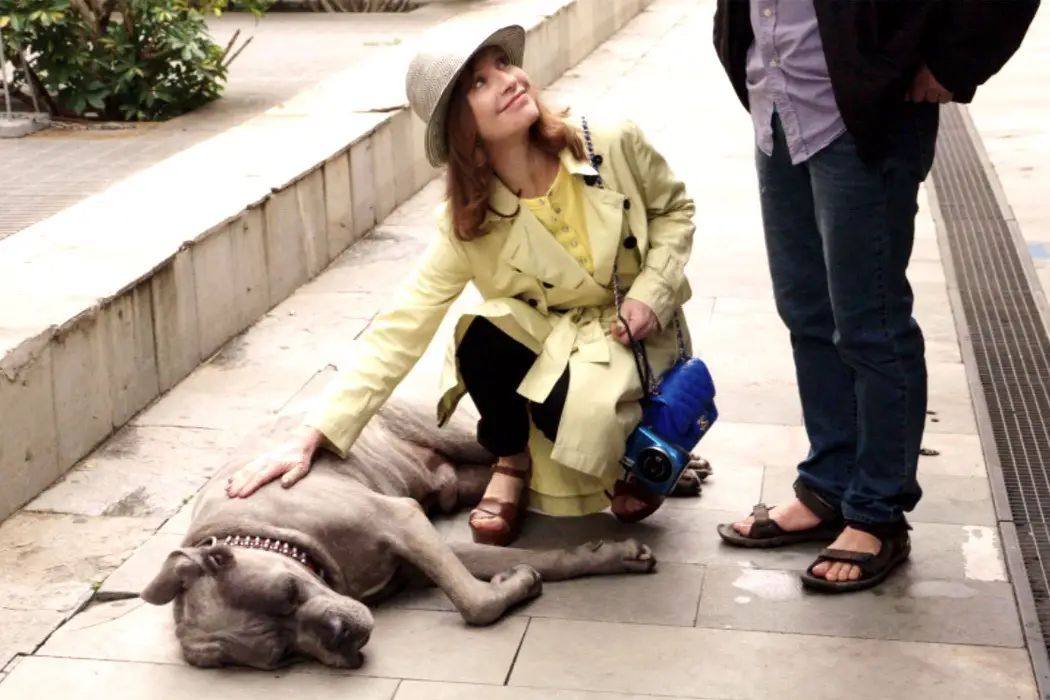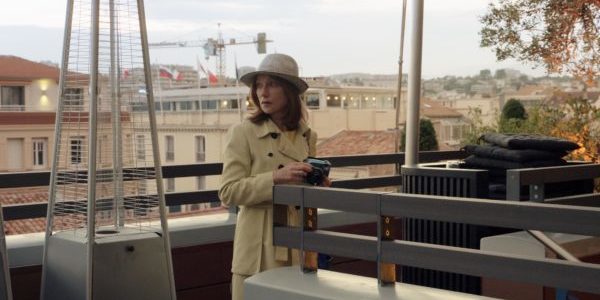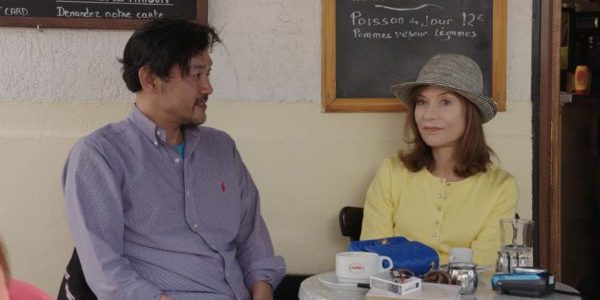CLAIRE’S CAMERA: The Compelling Unfamiliarity Of Hong’s Honesty

Midwesterner, movie lover, cinnamon enthusiast.
Reading a synopsis of Claire’s Camera, one of Hong Sang-soo’s two films to be released in the United States this spring, won’t get you very far: a French high school teacher in Cannes meets a Korean filmmaker and a young Korean woman who was recently fired by his assistant. That’s because what actually happens in Claire’s Camera feels elusive and intangible.
This is the second time Hong has worked with Isabelle Huppert (playing the high school teacher), following 2012’s In Another Country. That film was my introduction to the prolific director who, I’m starting to learn, has a very distinct style. In Another Country has a meandering and modest quality, and is preoccupied with its own narrative construction. I enjoyed it while not always knowing what to make of it, feeling like I needed to calibrate myself to Hong’s work in order to better digest it. Claire’s Camera has given me that chance. While having drastically different stories, this pair of Huppert films have already started to congeal in my memory, which isn’t a critique as much as an observation of Hong’s style between them.
On the surface, they’re defined by Huppert’s performances — I’ve never seen her quite like this. Under Hong’s direction, she’s disarmed of her usual austerity, instead projecting a bouncy, amiable lightness. The actress has described her In Another Country character as a “fairy.” In Claire’s Camera, she has a similar effervescence. She’s curious about the people around her, earnestly interested in what they do, why they’re sad or happy, or why they are where they are.
Claire spends the majority of the film talking with the young woman (Manhee) and director (So), separately, in restaurants and on the beach of Cannes. Sometimes the conversations are simple, sometimes they’re dark and personal. When critics invoke the work of French New Wave auteur Eric Rohmer next to Hong’s, it’s not hard to imagine why (and Hong seems to encourage it here: Claire’s Knee). But instead of philosophical pontifications, Hong’s films have a simple language.
A Simple Craftsmanship
Likewise, his craftsmanship is rooted in simplicity. He traffics mostly in master shots, watching people talk at a table, following them on the street or the beach. Hong hardly ever cuts for reaction shots or to offer counter perspectives. Instead, he’ll start a new scene with what seems to be an insert shot (a book being pulled off a shelf or a drink being poured into a glass), then zooms out (sometimes gracelessly) into a wide shot in order to follow his actors for the rest of the scene.

While ordinary and pragmatic, there’s a poetry in this movement — a beautiful minutiae that calls attention to our place as a viewer. It actually reminds me a bit of two American directors: Woody Allen and Robert Altman. Allen has always had a similar comfort with and admiration for the master shot, foregrounding extensive exchanges of dialogue over the changing perspectives of an edit. But it’s perhaps more evocative of Altman, who was similarly fond of liberally zooming his way around a scene. Like Altman, Hong’s films also feel improvised and like odd acts of observation.
“For long stretches, Hong does his best to make you forget the presence of the camera, setting up extended takes with so little camera movement and such graceful arrangements that they feel almost accidental,” said Max Nelson in Reverse Shot’s review of In Another Country. “They’re not, of course, and just when we’re ready to praise Hong for so effectively hiding his tracks, he’ll throw in a sudden, seemingly gratuitous zoom. It’s as if he wants us to comfortably inhabit the world before the camera, as his characters do, and then suddenly to be forced to confront the man behind it.”
These moments that Nelson calls “gratuitous zoom” disrupt a form that we’ve been taught over a century of films. I’m not quite sure what to make of them, but I appreciate their awkwardness. As I mentioned, Hong’s technique gives the viewer more awareness of themselves as a viewer, and thus fosters constant reflection of what you’re watching – if it doesn’t altogether alienate you. Whether or not it does, it’s safe to say the director’s cinema, judging from his pair of Huppert films, is unusual, which ultimately stems from how he works.
A Style Born Out of Constrictions
As is detailed in just about every interview with Hong, each film, he secures a few locations and a few actors, whom he tells the basics of the characters they’ll be playing. During shoots, he gets up every morning and writes the day’s material, which gets to the actors shortly before filming.

Using a small handful of locations, in particular, imbues the film with an odd, ruminative sense. When Manhee (Kim Mihee) finds herself at the same table that she was earlier fired at, this is obviously a product of securing only a few locations, but Hong uses it to his advantage and it becomes a very contemplative moment as she recalls her bosses voice in her head. This concept is examined at length in In Another Country, which is built on the concept of reimagining the same spaces.
“I make use of the things that come to me while shooting as I incorporate them into an evolving whole. I don’t even know what I know about a given actor. And I don’t try to organize or explain what I know. But on the day of shooting, the particular situation and the conditions of the film come together to create a kind of pressure. That pressure allows a few things among the many thoughts and feelings I have about this actor to come out. I write them down,” he told Hollywood Reporter.
At one point, So (Jung Jinyoung) tells Claire, “It’s hard to make honest films. You have to be honest in real life too.” I have a hunch that Hong agrees with his on-screen analog, that making films out of impulse — waking up and writing what comes to him — strips away machinations that might strike him as false or dishonest. I really don’t know what to make of his films as a result of how they eat away at some of the pillars of film language, thereby tossing a wrench in my basic expectations of cinematic storytelling, but it’s not hard to appreciate something so earnestly and mundanely strange. Perhaps the honesty that So preaches is another way of describing movies made with such disregard for familiarity.
“If it’s hard to make honest films, there can be little doubt that Hong is willing to put in the work. The leisurely tenor of Claire’s Camera belies the filmmaker’s workaholic spirit,” said Daniel Witkin in his review for Reverse Shot. It would be easy to toss off a film like Claire’s Camera as a slight experimentation because of its lack of determination to hammock light, expository scenes with climactic ones, instead letting depth arise out of small, unassuming conversations. And knowing how Hong makes his films probably makes it even easier for some to discount his work altogether.
For some reason, cinephilia is overflowing with viewers who have a perverse idea of cinema as something of determination: the idea that good movies show a director in full control of their work, like a chess master, configuring the elements of film to make a statement. It’s so refreshing to watch films by Hong — a director who relinquishes that myth, letting the film come to him instead of bending it to his will.

In an interview with Film Comment, where Hong seems uncommonly curt, he’s asked if his recent string of straightforward narratives is a purposeful move away from conceptual films. He responds, “No purpose that I’m conscious of. I’m a person who only responds to ‘what is given’ (at least in important choices), and the ‘what is given’ should be intrinsically something that I cannot know why and how it comes.” The interviewer persists, asking if he sees his three most recent films (On the Beach at Night Alone, Claire’s Camera and The Day After) as connected: “I’m sure they’re all connected, in a sense that they all came out of me.”
He’s less coy about his process in an interview with Mubi, saying, “I want to create something right now, in the moment, spontaneously. Sometimes I think about why I do this, writing in the morning, and I’ve come up with this explanation: it’s my temperament. I remember even when I was young, I would have a good time with my friends and then one would say, ‘Let’s meet again this weekend.’ I’d say ‘no.’ I didn’t want to have a preparation period. It’s my temperament.”
Conclusion: Claire’s Camera
I side with Witkin when he echoes Joan Didion, saying Hong’s method “foregrounds the process of narration, not just in filmmaking but in the ways that people come up with stories to understand their lives.” Watching Claire’s Camera feels like watching a film being made right in front of you. Claire carries a polaroid camera around her neck throughout the film, occasionally taking candid photos of people she’s with. At one point, Manhee asks Claire why she’s always taking photos. She responds, “The only way to change things is to look at everything again, very slowly.” Hong is laying bare that he doesn’t know where he’s taking us, but he’s just as interested to find out. At least he’s being honest.
What do you think of Hong’s strange style? Tell us your thoughts in the comments below!
Claire’s Camera was released in the U.S. on March 9, 2018. For all international release dates, see here.
Does content like this matter to you?
Become a Member and support film journalism. Unlock access to all of Film Inquiry`s great articles. Join a community of like-minded readers who are passionate about cinema - get access to our private members Network, give back to independent filmmakers, and more.













